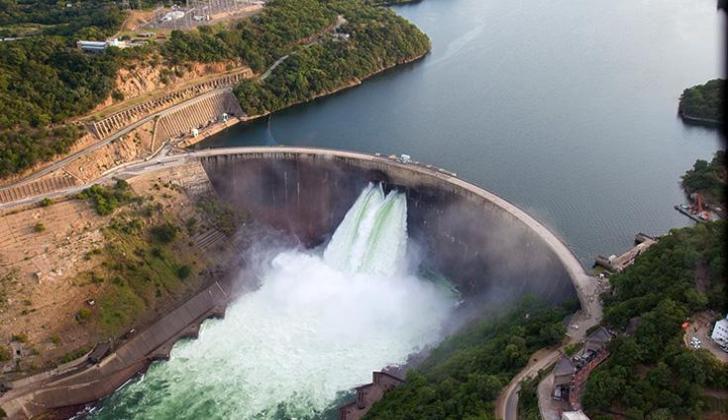News / National
Kariba Dam collapse claims rubbished
17 Jul 2024 at 05:38hrs |
0 Views

The Zambezi River Authority (ZRA) has dismissed social media rumors that the Kariba Dam wall is weak and on the verge of collapse. The ZRA, jointly managed by Zambia and Zimbabwe, oversees the river from Kazungula to Luangwa. Currently, a US$294.2 million rehabilitation program is underway at the Kariba Dam, funded by the European Union, the African Development Bank, the Swedish Government, and the World Bank, with ZRA contributing US$19.2 million.
The United Nations has emphasized the importance of prolonging the dam's lifespan to ensure continued power generation. During a recent tour of the rehabilitation project, UN representative Edward Kallon, Mashonaland West Minister of State Marian Chombo, and their delegations reviewed the progress.
Dam management services senior manager, Engineer Charles Chibvura, explained that the rehabilitation works are designed to extend the dam's lifespan. Completed tasks include reshaping the plunge pool, involving the excavation of approximately 750,000 tonnes of rock, and stabilizing 20,000m² of slopes. Ongoing projects include refurbishing the spillway control facility and institutional strengthening. These efforts aim to extend the dam's life by an additional 60 years, benefiting energy production in Zimbabwe and Zambia.
The dam, which generates around 2,000 megawatts of electricity for both countries, also supports local livelihoods through fishing and tourism. The rehabilitation project is expected to be completed and commissioned in 2025.
Engineer Chibvura assured that the dam is currently safe and intact, with routine maintenance being a priority to protect the lives of over 4.5 million people downstream. He emphasized that the rehabilitation efforts are based on research and historical data, noting that many dams built between 1950 and 1990 are now undergoing similar maintenance due to the increased knowledge available today.
Historically, dam failures have led to significant loss of life, including the South Fox Dam disaster in 1889 and the Vajont Dam collapse in 1963. Such precedents underscore the importance of the ongoing rehabilitation work at Kariba Dam.
UN representative Kallon praised the progress and efforts to mitigate challenges posed by climate change and El Nino-induced droughts. Minister Chombo urged further investment in the Kariba district, highlighting the impact on local communities, including the Tonga people who were displaced by the dam's construction. It was noted that climate change continues to affect water levels, with a significant decrease in this year's harvest compared to the previous year.
The United Nations has emphasized the importance of prolonging the dam's lifespan to ensure continued power generation. During a recent tour of the rehabilitation project, UN representative Edward Kallon, Mashonaland West Minister of State Marian Chombo, and their delegations reviewed the progress.
Dam management services senior manager, Engineer Charles Chibvura, explained that the rehabilitation works are designed to extend the dam's lifespan. Completed tasks include reshaping the plunge pool, involving the excavation of approximately 750,000 tonnes of rock, and stabilizing 20,000m² of slopes. Ongoing projects include refurbishing the spillway control facility and institutional strengthening. These efforts aim to extend the dam's life by an additional 60 years, benefiting energy production in Zimbabwe and Zambia.
Engineer Chibvura assured that the dam is currently safe and intact, with routine maintenance being a priority to protect the lives of over 4.5 million people downstream. He emphasized that the rehabilitation efforts are based on research and historical data, noting that many dams built between 1950 and 1990 are now undergoing similar maintenance due to the increased knowledge available today.
Historically, dam failures have led to significant loss of life, including the South Fox Dam disaster in 1889 and the Vajont Dam collapse in 1963. Such precedents underscore the importance of the ongoing rehabilitation work at Kariba Dam.
UN representative Kallon praised the progress and efforts to mitigate challenges posed by climate change and El Nino-induced droughts. Minister Chombo urged further investment in the Kariba district, highlighting the impact on local communities, including the Tonga people who were displaced by the dam's construction. It was noted that climate change continues to affect water levels, with a significant decrease in this year's harvest compared to the previous year.
Source - The Herald
Join the discussion
Loading comments…

































